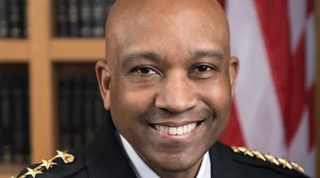Dr. Errol D. Toulon, Jr. is the Sheriff of Suffolk County, New York on Long Island. He was born and raised in the Bronx in New York City, and his father and brother were both wardens on Rikers Island. As such, Toulon learned about the criminal justice system from a very early age; in 1982 he joined the New York City Department of Correction where he had a 22-year career in uniform serving in various positions in the Emergency Service Unit, Firearms & Tactics Unit and Compliance Unit. He retired as a captain due to health reasons. In 2014, he returned to the Department of Correction as the Deputy Commissioner of Operations overseeing the Intelligence Unit, Training Academy, Applicant Investigations Unit, Emergency Management and Compliance Units. Taking office in January 2018, Sheriff Toulon is the county’s first African American person to be elected to a non-judicial countywide office. He received his bachelor's degree in Business Administration from Monroe College, a master’s degree in Business Administration and a doctorate in Educational Administration from Dowling College.
Q: Where do you get your passion for helping people involved in the criminal justice system?
When I was a child, my father told me that his job as a warden was about rehabilitating people who were incarcerated; however, he also used the same moniker of “bad guys” that needed to be in jail. When I was a captain on Rikers Island, I would often tour our various facilities, talk to the people in our custody and find out why they became incarcerated and if they experienced substance abuse and/or mental health issues. I believe 85 percent of men and women that come into our facilities are individuals that have mental health and substance abuse issues, or they just made some poor choices. Many come from areas and families that experience multi-generational trauma due to community and family violence.
When I became sheriff, I used this experience to affect change in my community. We can assist those men and women with the treatment they need and can connect them with resources in the community to continue care post incarceration. I am extremely passionate about ensuring people continue to receive this level of care while involved with the justice system.
Q: What are some of the initiatives you’ve started to help people with mental illness and/or substance use disorders involved in the justice system?
Here in Suffolk County, we created The Sheriff's Transition and Reentry Team (START), where we work with the judicial system, The Legal Aid Society and The Criminal Bar Association to offer case management and support to help address the needs of people in our custody and upon release.
The START Resource Center is located at our Yaphank Correctional Facility and staffed by correctional officers. In our jails, we start reentry on day one of incarceration. We interview inmates at jail admission and have them complete a packet of information where we assess their needs and life goals. Officers and our partners support people with substance abuse treatment, education, job and resume assistance, social services enrollment, driver's license and identification issues, transportation, food, housing and clothing. We also provide referrals to community-based services upon release. We help people create resumes and conduct job searches and provide business attire for job interviews. We also provide transportation for interviews, as transportation can be a huge barrier in Suffolk County. We have identified employers who are willing to hire a formerly incarcerated individual and work with social services agencies in various communities to connect people to health care and continue treatment. We are trying to address structural barriers to reentry, and the staff has truly built trust among our community members involved in the justice system. In fact, with START, more than 350 people have returned to our resource center or reached out for further assistance who are no longer involved in the justice system.
We also have a serious addiction treatment program and are very much involved in the drug court. We continue to talk to judges and defense attorneys on how we can improve. We can always do better, and I push my staff so that our office can mitigate crime before it occurs and reduce our jail population.
Lastly, we partnered with Stony Brook University School of Social Welfare on our family reunification project to bring graduate-level interns to the jail to work with inmates and their families to improve relationships while people are incarcerated and when they are released. We know that family involvement can be key to a person’s success once they are no longer in our custody.
Q: Who have been some of your most valuable partners in this work?
We have worked with many community partners who have helped identify individuals with mental health or substance abuse issues. We created a satellite facility partnering with one of our service providers, Spin the Yard, to assist with transportation and networking with other programs to make sure people are receiving the assistance they need.
In addition, since many of our female inmates are victims of human trafficking and have substance use disorders, The Empowerment Collaborative of Long Island is another important community partner, particularly for women and children. We also partner with many local advocacy groups and monitor data to understand where in Suffolk County there are hotspots of people suffering from mental health and substance abuse issues and how to best address it. We also use data analysis in our schools through a program called Deconstructing the Prison Pipeline, which seeks to improve policy and craft initiatives to prevent youth from getting involved in the justice system by helping to identify root causes of youth delinquency.
Q: How is your office working with the community to address race equity for people involved in the justice system?
First, I am always looking at data to help us understand the problem. As Sheriff, I have made it a priority for our office to use data to identify community members at risk of incarceration. We focus on factors such as demographics and ethnicity, education level and employment type. Do they have children? With these variables, we see where certain trends are occurring and can drill down to the root causes of some of the issues that our residents face before and after incarceration.
Since last year (2020), we started a training course for fair and impartial policing not only for our deputy sheriffs and correctional officers, but also civilian personnel. We have implemented customer service training for sworn and civilian personnel that are interacting with the public. I do not, however, believe that a training course will really allow us to understand our own biases, so we have made it incumbent upon our supervisors to reinforce this training throughout our daily work. Since it is very difficult to change someone’s inherent views in just a couple training sessions, we conduct them regularly to at least recognize these biases and reinforce the need for change.
There needs to be a basic understanding of respect from law enforcement to the people in our community and those that are incarcerated. The death of George Floyd was a tragedy, and law enforcement needs to find a balance when interacting with the community between who is an actual threat and who may be experiencing a mental health or substance abuse crisis.
Q: What more can Suffolk County do to help people living with mental illness and/or substance use disorders?
What is needed not only for Suffolk County, but our nation, is investment in social services. People need help before they interact with law enforcement. By the time someone is incarcerated, the individual has most likely shown many red flags. The pandemic has caused a mental health and substance abuse crisis in this country and with so much trauma and disruption in our society today, the government needs to focus on increasing funding in our communities for social services. This would certainly lead to fewer negative interactions with law enforcement and less incarceration. We may be able to save not only a lot more lives but change people's lives so that families and communities are safer.
Q: What inspires you about this work?
I'm a two-time cancer survivor, so I probably shouldn't be here. My second battle was with pancreatic cancer and it has made me feel that I'm here for a purpose. I was a deputy commissioner at Rikers Island for 25 years and I didn't have the direct impact that I have now. I have been a resident of Suffolk County now for 31 years and I can see the impact I have on my staff and the individuals that are incarcerated in the community. This is what gives me joy because I can affect real change and help people. It motivates me every day.
Q: Do you have any recommendations for other communities or advice for your peers?
You can never have enough partners in this, whether it's NACo or law enforcement agencies, community partners or community members. I engage with our community to understand what various populations in Suffolk County are dealing with so I can understand what we need to do and identify potential and changing trends. As a sheriff, it is important to talk to law enforcement agencies and community partners throughout the country to see what they are dealing with and how to best prepare. Finally, humility is crucial. You need to talk to everyone and can never have enough engagement with people. There is much to learn from other people’s experiences.

